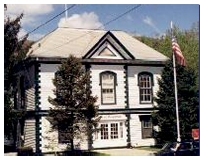 Board Works through Preliminary Budget Draft
Board Works through Preliminary Budget Draft
By Liz Schevtchuk Armstrong
As the Philipstown Town Board continued drafting the 2012 town budget, anticipated at $8,802,369 so far, a Garrison Volunteer Fire Company (GVFC) official advocated that the town override the statewide 2 percent tax-increase cap and expressed doubts that the “will of the people” is to limit spending on the fire company. The GVFC plea came last week during a public hearing on the 2012 budget. The Town Board tentatively scheduled a vote on budget adoption for this coming Wednesday, Nov. 16. Under the direction of Gov. Andrew Cuomo, New York State has imposed a 2 percent ceiling on property tax hikes and Supervisor Richard Shea has pledged to abide by it for the 2012 budget, which takes effect Jan. 1.
According to preliminary figures, Philipstown’s 2012 town budget would exceed the $8,510,649 fiscal 2011 budget by $291,720. Per $1,000 of property value, taxpayers in the “general town-wide” category — residents of the villages of Cold Spring and Nelsonville — would face a 3.24 percent increase over 2011 and those in the general town “outside-the-villages” category would see a 3.4 percent increase. The preliminary budget shows estimated revenue of $1,762,834 for 2012, augmented by an expected $130,000 in an unspent balance at the end of 2011, leaving $6,909,535 to be raised by taxes. When it comes to higher taxes for 2012, “we are going to come in at 2 percent, come hell or high water,” Shea said Thursday night, Nov. 10, at the budget session.
But Peter von Bergen, GVFC secretary, questioned whether that reflects taxpayer desires. In September, the GVFC proposed a basic 2012 budget of $650,000, which did not include some personnel-related costs, such as money for the fire-service award, a firefighter pension. The Town Board’s preliminary budget lists a GVFC budget, including the pension, of $596,269. “You don’t have to limit it to a 2 percent tax,” von Bergen told the Town Board. “You want to say that it’s the will of the people. I’m not sure it’s the will of the people.”
‘I think it’s the will of this board,” Councilor Nancy Montgomery informed him.
“The will of the people notwithstanding,” other municipalities have taken action to circumvent the limit, von Bergen went on. “If you want to override the 2 percent cap you can blame it on Garrison. I don’t think the public in our community would be terribly upset if you override” it.
“The answer is ‘no’ to that,” Shea responded. Von Bergen contended that the GVFC has already suffered. Last year, when the Town Board pared the GVFC requested budget, “we ended up losing 24 percent,” he said. Shea maintained that “all of that money came out of reserves,” not allocations for operations. “But we still should have reserves,” to cover upcoming needs, von Bergen said. Moreover, many of the company’s funds are designated for specific uses, he explained.
Two audience members questioned the reserves. “Why should the fire company hold my money?” Stan Freilich asked, observing that in a harsh economic time, many taxpayers lack a financial reserve. Joe Regele, a frequent critic of GVFC finances, said the GVFC restrictions on reserves are self-imposed. “The fire company actually has a significant amount of money on hand,” he said. “It seems to me there’s an issue of priorities.” He said that to meet some needs, such as the cost of a new firehouse generator, the fire company could use some of the money set aside for subscriptions and conventions. He also maintained that “money is spent and we don’t really know where. It’s all very opaque.”
Freilich brought up the Graner report, the controversial town-wide study of fire protection services, which urged the merger of the town’s four departments into a single fire district. “I haven’t heard it mentioned in this budget process,” especially in regard to sharing of equipment and similar cooperation, he said. “There is cooperation,” Councilor John Van Tassel answered. “As far as financial consolidation goes, I don’t think that’s possible right now.”
Proposed ambulance corps budget
For ambulance coverage, the preliminary budget contains $115,131 for the Garrison Volunteer Ambulance Corps (GVAC) and $183,356 for the Philipstown Volunteer Ambulance Corps (PVAC), plus $15,360 for the service award pensions (an increase of nearly 20 percent over 2011), for a total of $313,847. By comparison, the fiscal 2011 budget allocated $309,190 for ambulance service.
Pat Odell, of the PVAC said that “we’re continuing to look into any type of grants we can” to help with funding. But “we’re still going to be looking at a shortfall this year,” due in part to unfunded mandates – new requirements imposed by other levels of government for more sophisticated equipment, Odell said. He said the corps does not conduct an annual fundraising drive because “it’s tough financial times for everybody. And we don’t want to beat up the residents any more than we have to.” At the Garrison corps, too, “Money is tight,” said GVAC President Gordon Hubbard. Nonetheless, “we have a little bit of safety” financially. At some stage, he added, the corps should set aside money for a new ambulance. If they defer too long, “eventually it’s going to catch up to us,” Hubbard said.
Town Officials’ Salaries
As the meeting closed, Shea pointed out that the yearly salaries for the Town Board remain relatively low. In the preliminary budget, the salaries are the same as in 2011 — $17,000 for each councilor and $25,000 for the supervisor, although Shea said his position “is bordering on a full-time job now.” He also noted that the budget request submitted by the Highway Department calls increasing the highway superintendent’s salary by 5 percent, from $90,000 to $94,500. “I just don’t see that happening,” Shea said.

